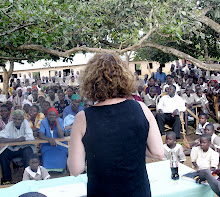Hardly seems possible that it was 2 years ago I was readying for Obama's Inauguration. The tee shirts and slogans abounded and one that I loved was a take off on Got Milk? I wear it now and it says Got Hope? I'm not really sure. I'm not talking about Obama or the horrific shooting in Arizona yesterday, I'm talking about the Sudan. I read different accounts of the voting today and it's mixed. Of course our news reports some killings, but the African papers seem to be saying it's going pretty well.
A good friend talked me out of going there right now. He assures me that the rebels are coming up from Darfur and that the north is going to have to stop them. Then he went into all the other possibilities of potential dangers in the Sudan as it reaches its arms up to the to snatch a new country down from the African sky.
Southern Sudan, how will it name itself? What flag will it fly? What anthem? And how will the North and the South divvy up the oil, the people, the rest of the resources? I read in the Nation that the religious animosity is beginning. The president of the Sudan already has started by saying that any southern sudanese who work in the north will be fired. And he's going to make Islam the national religion of the North.
Having lived through the chaos of Kenya's ugly election violence and watching how their constitutional referendum came with such peace is encouraging. I ask myself will the Sudanese be tired of fighting and end up in peace, I hope so. But again, I have to be honest. I don't really have hope. I wish I did.
Stay tuned y'all and I'll keep you informed. Our papers never really cover Africa.
Here's what the Nation had to say about it.
A soldier guards a polling station in Juba on January 9, 2011 on the first day of a week-long independence referendum expected to lead to the partition of Africa's largest nation and the creation of the world's 193rd UN member state. AFP PHOTO/Roberto SCHMIDT
By EMEKA MYAKA GEKARA newsdesk@ke.nationmedia.comPosted Sunday, January 9 2011 at 22:00
Even as Southern Sudanese appear likely to vote for divorce with the North, the real test of a peaceful coexistence with Khartoum will depend on how the two states resolve contentious issues.
The two states would also have to agree on a common currency, payment of foreign debt and the future of the oil-rich region of Abyei.
The agreement must be reached before July 9 when the new state would be proclaimed.
The other thorny issue is the fate of the nearly 1.5 million Southern Sudanese — mostly Christian — living and working in the North.
President Omar-al-Bashir has already declared that if the southerners opt for separation those working in the North will be discharged.
The Southern Sudanese hold 20 per cent of the jobs in public service.
Mr Bashir has announced that if the South goes separate, he will change the constitution in the North to impose Sharia law and ensure that Islam and Arabic are the official religion and language, respectively.
Analysts have warned unless mutually agreed upon, they contentious issues run the risk of re-igniting conflict and preventing smooth secession.
“We are supposed to decide on how to deal with the huge $35 billion (Sh2.8 trillion) external debt and the sharing of boundaries.
Our breaking away will not mean that we cut oil to the North,” says Mr Garang Majak Angok, a former Finance minister in the South.
President Bashir and Salva Kiir of the South, have pledged to resolve the issues with sincerity, fairness and in consistency with international laws to ensure cordial relations between the two possible states.
“I have reiterated several times that even if Southern Sudan separates from the North it will not shift to the Indian Ocean or to the Atlantic Coast,” said Mr Kiir recently.









No comments:
Post a Comment